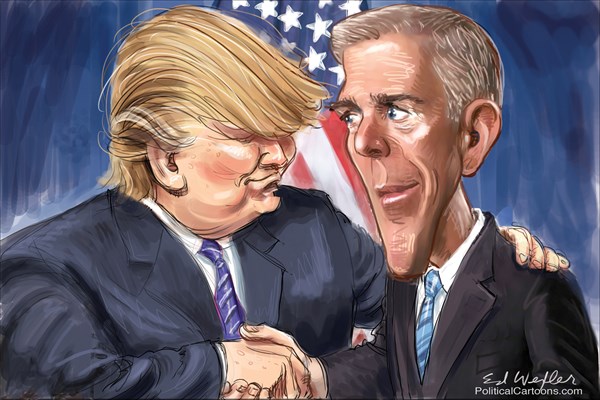
WASHINGTON - President Donald Trump's Supreme Court nominee Neil Gorsuch will likely be confirmed to the high court since Republicans control the Senate and Democrats may want to hold their powder until the next court opening. But Americans' initial positive reactions to his nomination are another reason for Gorsuch -- and Trump -- to be optimistic about his confirmation chances.
In several polls conducted this month, Gorsuch received net positive ratings for his approval. He had a +13 point net approval rating among Americans in a Gallup poll, the same as in a CNN/ORC poll and a CBS News poll. In a Quinnipiac poll, Gorsuch received a +20 point net approval of his confirmation among registered voters.
Approval of Gorsuch's pick clearly outpaces Trump's popularity overall, which continues to languish in negative territory in most national polls.
Gorsuch's ratings are slightly weaker, however, than Merrick Garland's marks were in polls last year. Garland had a +23 point net approval among the general public in a Gallup poll and +19 from CNN, while Quinnipiac had Garland at a similar +21 among voters.
Looking back at previous nominees, Gorsuch's ratings are slightly lower than other Supreme Court nominees before him. Elana Kagan's ratings in 2010 were remarkably similar to Gorsuch's now: a +18 positive margin in Quinnipiac and CNN along with a +14 in Gallup. In May 2009, Sonia Sotomayor enjoyed higher +26 and +30 ratings from Gallup and Quinnipiac, respectively. And Samuel Alito saw a similar positive of +14 in Quinnipiac and a stronger +25 in Gallup in 2005. Gallup found even more positive ratings for John Roberts in 2005 (+37), Ruth Bader Ginsberg in 1993 (+39) and Clarence Thomas in 1991 (+35).
President George W. Bush's fizzled nomination of Harriet Miers garnered significantly lower ratings than other nominees, just +8 in a Gallup poll taken soon after her nomination.
Supreme Court nominations often thrust potential justices from obscurity into contentious political debates, with initial polls tapping only the public's first impressions. Indeed, a pretty large chunk of Americans do not have a firm opinion on Gorsuch. Between 15 and 23 percent volunteered that they have no opinion on Gorsuch's nomination in Quinnipiac, CNN and Gallup polls. Over half of adults (53 percent) said they "can't say" whether they'd like Gorsuch to be confirmed in the CBS poll. These high levels of "no opinion" are a function of polling technique -- the question wording in the CBS poll explicitly mentions an option for "you can't say," a method that typically results in a larger share of respondents picking that option.
That uncertainty about Gorsuch is similar to views about previous nominees just after their selection. An identical 53 percent had no opinion of Kagan and Sotomayor in CBS polls conducted after their announcements, and even more had no opinion of nominees before them: 75 percent didn't know enough to respond about Alito, 60 percent for Roberts, 59 percent for Thomas and 66 percent for Robert Bork.
Approval for Gorsuch breaks down on clear partisan lines. Republicans are united in their support, with the CNN poll finding over 8 in 10 saying the Senate should confirm him (84 percent). About 6 in 10 Democrats are opposed, while independents favor nomination by a 47 to 35 percent margin.
Most Americans disapprove of Senate Republicans' decision to block an up-or-down vote for Garland after his nomination by then President Barack Obama in 2016, with 56 percent of voters saying Republican senators were wrong to prevent the vote in the Quinnipiac poll taken earlier this month.
And Americans have a similar view with respect to Gorsuch, with nearly two-thirds saying Senate Democrats should allow a vote on Gorsuch's nomination in the Quinnipiac poll (65 percent). As with Republican-led opposition to Garland, it's not clear Democrats will face significant blowback for resisting Gorsuch's nomination. The CBS poll found 51 percent saying Democrats would be justified in using Senate procedures to prevent an up-or-down vote on Gorsuch.
Trump has not enjoyed the honeymoon period that many presidents have before him, but his Supreme Court nominee selection seems to be following a well-trodden path where most Americans approve of whomever the president nominates, even if that support isn't fervent.


 Contact The Editor
Contact The Editor
 Articles By This Author
Articles By This Author